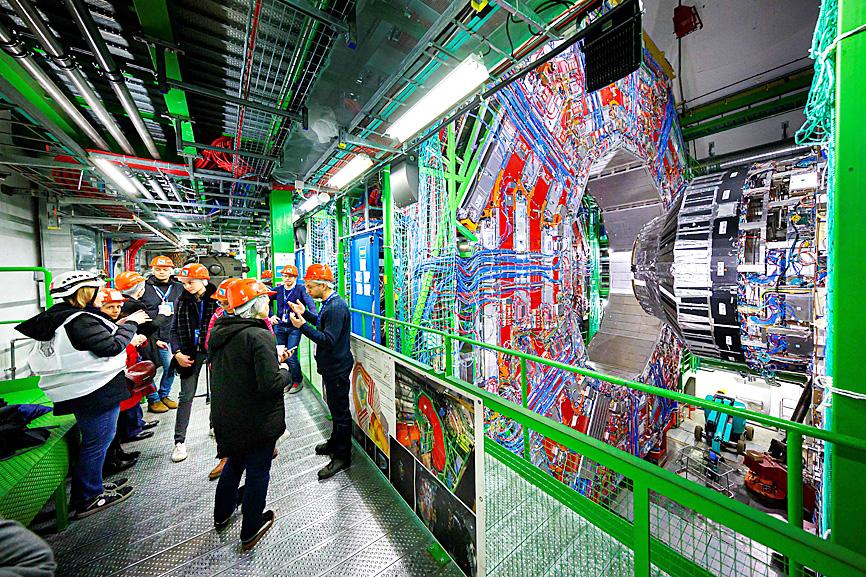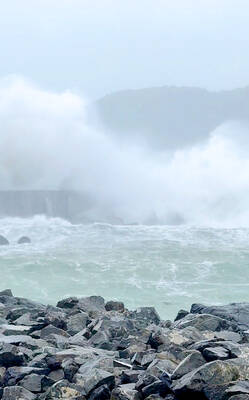Ten years after it discovered the Higgs boson, the Large Hadron Collider is about to start smashing protons together at unprecedented energy levels in its quest to reveal more secrets about how the universe works.
The world’s largest and most powerful particle collider started back up in April after a three-year break for upgrades in preparation for its third run. From today it will run around the clock for nearly four years at a record energy of 13.6 trillion electronvolts, the European Organisation for Nuclear Research (CERN) announced at a news conference last week.
It is to send two beams of protons — particles in the nucleus of an atom — in opposite directions at nearly the speed of light around a 27km ring buried 100m under the Swiss-French border.

Photo: AFP
The resulting collisions would be recorded and analyzed by thousands of scientists as part of a raft of experiments, including ATLAS, CMS, ALICE and LHCb, which would use the enhanced power to probe dark matter, dark energy and other fundamental mysteries.
“We aim to be delivering 1.6 billion proton-proton collisions per second” for the ATLAS and CMS experiments, CERN’s head of accelerators and technology Mike Lamont said.
This time around the proton beams will be narrowed to less than 10 microns — a human hair is about 70 microns thick — to increase the collision rate, he said.
The new energy rate would allow scientists to further investigate the Higgs boson, which the Large Hadron Collider first observed on July 4, 2012.
The discovery revolutionized physics in part because the Higgs boson fit within the Standard Model — the mainstream theory of all the fundamental particles that make up matter and the forces that govern them.
“The Higgs boson is related to some of the most profound open questions in fundamental physics today,” said CERN director-general Fabiola Gianotti, who first announced the Higgs boson’s discovery a decade ago.
Compared with the collider’s first run that discovered the Higgs boson, this time around there would be 20 times more collisions.
“This is a significant increase, paving the way for new discoveries,” Lamont said.
CERN head of research and computing Joachim Mnich said that there was still much more to learn about the Higgs boson.
“Is the Higgs boson really a fundamental particle or is it a composite?” he asked. “Is it the only Higgs-like particle that exists — or are there others?”
Experiments have determined the mass of the Higgs boson, as well as more than 60 composite particles, but CERN theoretical physics department head Gian Giudice said observing particles is only part of the job.
“Particle physics does not simply want to understand the how — our goal is to understand the why,” he said.
Among the Large Hadron Collider’s nine experiments is ALICE, which probes the matter that existed in the first 10 microseconds after the Big Bang, and LHCf, which uses the collisions to simulate cosmic rays.
After this run, the collider is to come back in 2029 as the High-Luminosity LHC, increasing the number of detectable events by a factor of 10.
Beyond that, scientists are planning a Future Circular Collider — a 100km ring that aims to reach energies of 100 trillion electronvolts, but for now, physicists are keenly awaiting results from the Large Hadron Collider’s third run.
“A new physics season is starting,” CERN said.

Heavy rain and strong winds yesterday disrupted flights, trains and ferries, forcing the closure of roads across large parts of New Zealand’s North Island, while snapping power links to tens of thousands. Domestic media reported a few flights had resumed operating by afternoon from the airport in Wellington, the capital, although cancelations were still widespread after airport authorities said most morning flights were disrupted. Air New Zealand said it hoped to resume services when conditions ease later yesterday, after it paused operations at Wellington, Napier and Palmerston North airports. Online images showed flooded semi-rural neighborhoods, inundated homes, trees fallen on vehicles and collapsed

‘COST OF DEFECTION’: Duterte’s announcement could be an effort to keep allies in line with the promise of a return to power amid political uncertainty, an analyst said Philippine Vice President Sara Duterte yesterday announced she would run for president of the Southeast Asian nation of 116 million in 2028. Duterte, who is embroiled in a bitter feud with Philippine President Ferdinand Marcos Jr, was impeached last year only to see the country’s Supreme Court throw the case out over procedural issues. Her announcement comes just days before her father, former Philippine president Rodrigo Duterte, begins a pretrial hearing at the International Criminal Court (ICC) in the Netherlands over crimes against humanity allegedly committed as part of a brutal crackdown on drugs. “I offer my life, my strength and my future

NOT YET THERE: While the show was impressive, it failed to demonstrate their ability to move in unstructured environments, such as a factory floor, an expert said Dancing humanoid robots on Monday took center stage during the annual China Media Group’s Spring Festival Gala, China’s most-watched official television broadcast. They lunged and backflipped (landing on their knees), they spun around and jumped. Not one fell over. The display was impressive, but if robots can now dance and perform martial arts, what else can they do? Experts have mixed opinions, with some saying the robots had limitations and that the display should be viewed through a lens of state propaganda. Developed by several Chinese robotics firms, the robots performed a range of intricate stunts, including martial arts, comedy sketches and choreographed

POST-UPRISING: Bangladesh Nationalist Party lawmakers were yesterday expected to formally elect Tarique Rahman as their leader and new head of government Bangladesh’s prime minister-to-be Tarique Rahman and lawmakers were yesterday sworn into parliament, becoming the first elected representatives since a deadly 2024 uprising. Rahman is set to take over from an interim government that has steered the country of 170 million people for 18 months since the autocratic government of Sheikh Hasina was overthrown. The lawmakers, who promised loyalty to Bangladesh, were sworn in by Chief Election Commissioner AMM Nasir Uddin. Bangladesh Nationalist Party (BNP) lawmakers are expected to formally elect Rahman as their leader, with President Mohammed Shahabuddin then to administer the oath of office to the prime minister and his ministers